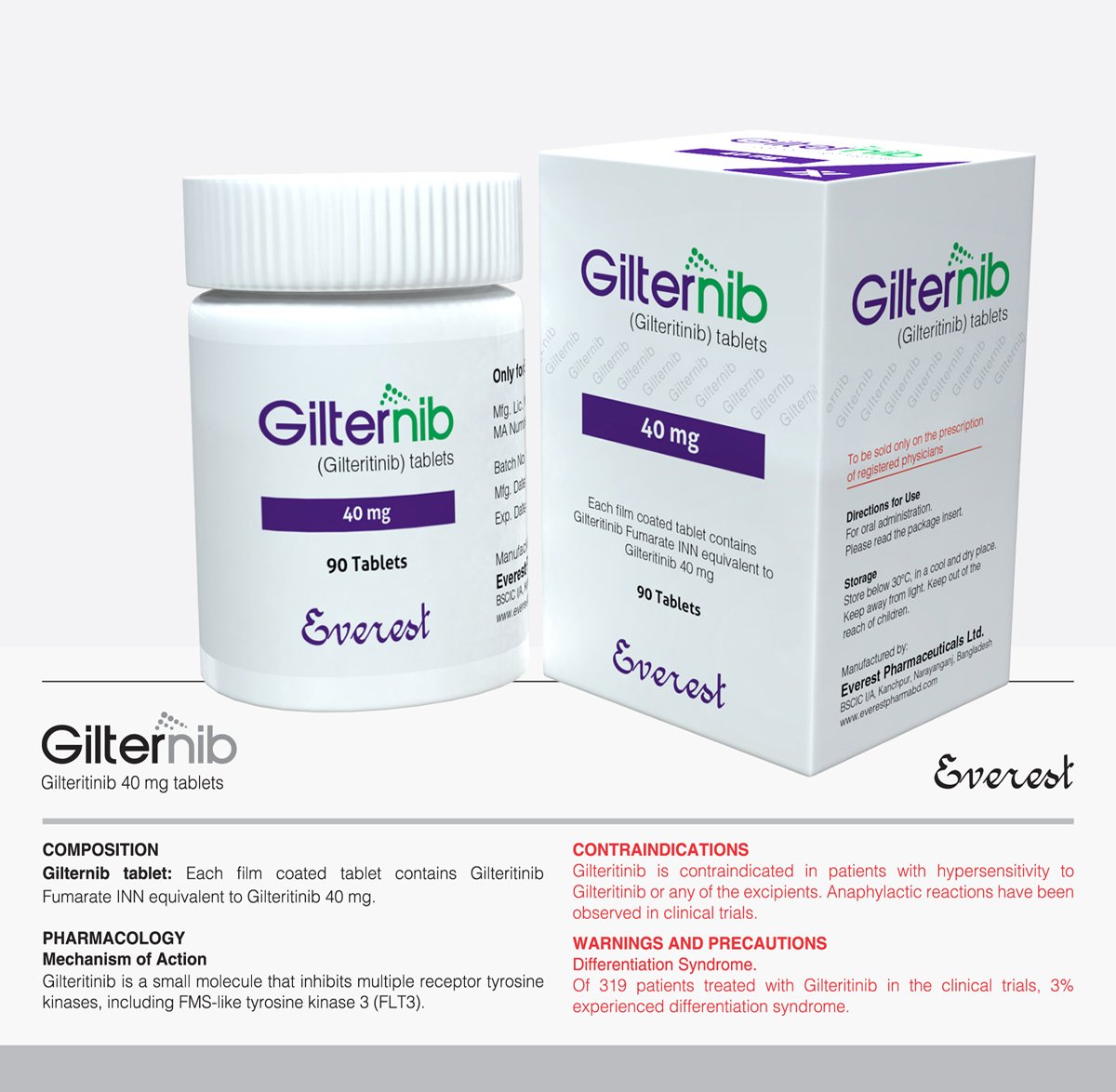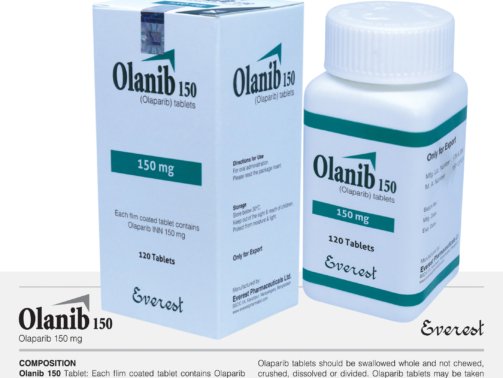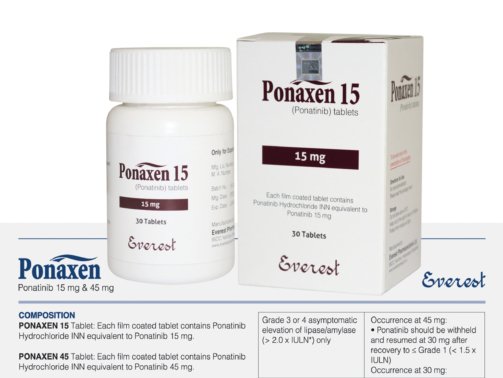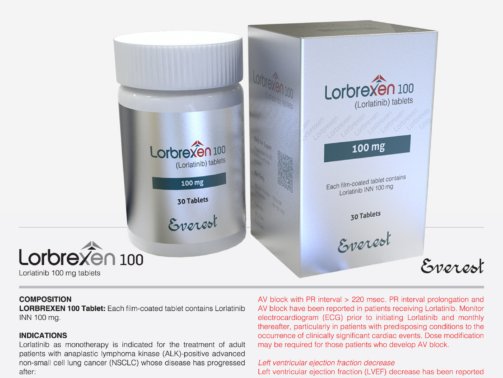Gilteritinib 40 mg (Xospata)
0.00$
Gilternib, also referred to by its International Nonproprietary Name (INN) Gilteritinib, is prescribed at a 40 mg dosage for adults dealing with relapsed or refractory acute myeloid leukemia (AML) characterized by a FLT3 mutation. Acting as a potent and specific inhibitor of FLT3, gilteritinib functions by targeting and blocking the FLT3 receptor tyrosine kinase, thus hindering the proliferation and survival of leukemia cells. Administered orally, gilteritinib presents a hopeful treatment option for AML patients who have relapsed or shown resistance to previous therapies.
Gilteritinib 40 mg is a medicinal product that contains Gilteritinib as its active component. This novel oral drug is designed for treating specific forms of acute myeloid leukemia (AML). Gilteritinib, a powerful and selective FLT3 inhibitor, focuses on particular genetic mutations present in AML patients, offering a tailored and efficacious cancer treatment.
Pharmacological Class
Gilteritinib is classified as a tyrosine kinase inhibitor (TKI). Specifically, it aims to block the activity of FMS-like tyrosine kinase 3 (FLT3), including both FLT3-ITD (internal tandem duplication) and FLT3-TKD (tyrosine kinase domain) mutations, which are often linked to poor prognosis in AML.
Indications and Usage
Gilteritinib 40 mg is indicated for treating adult patients with relapsed or refractory AML possessing a FLT3 mutation, as identified by an FDA-approved test. It is especially advantageous for patients who have not shown sufficient response to previous chemotherapy or stem cell transplant. The therapy provides a targeted treatment option in cases where conventional methods may have been unsuccessful.
Mechanism of Action
Gilteritinib functions by inhibiting the FLT3 receptor tyrosine kinase activity, which disrupts the signals that promote cancer cell growth and survival. Gilteritinib effectively reduces the burden of leukemic cells and promotes apoptosis (programmed cell death) by inhibiting both FLT3-ITD and FLT3-TKD mutant forms. It may also inhibit other kinases like AXL, ALK, and LTK, which contribute to its anti-leukemic properties.
Dosage and Administration:
Recommended Dosage: The usual oral dose is 120 mg, taken once a day. The 40 mg strength, however, permits dosing and titration adjustments as necessary.
Administration: Gilteritinib may be taken with or without meals. It is to be taken intact with water and must not be chewed or crushed.
Duration: The treatment persists until there is disease progression or intolerable toxicity.
Formulation and Packaging: Each film-coated tablet of Gilteritinib 40 mg contains 40 mg of the active ingredient. Depending on the manufacturer’s specifications, the tablets are usually packaged in either bottles or blister packs.
Warnings and Precautions:
QT-Intervall-Verlängerung: Es ist möglich, dass Gilteritinib das QT-Intervall verlängert. It is advisable to perform baseline and periodic ECG monitoring.
Differentiation Syndrome: a condition that can threaten life; fever, respiratory distress, and low blood pressure may be among the symptoms. It is essential to identify and treat promptly with corticosteroids.
Pancreatitis: Keep an eye out for symptoms like abdominal pain and increased serum lipase levels.
Hepatotoxicity: Conduct regular monitoring of liver function tests.
Drug Interactions:
The main metabolic pathway for Gilteritinib is via CYP3A4.
Stay away from grapefruit juice, as it can influence metabolism as well.
Be careful with other drugs that might lengthen the QT interval.
Negative Reactions: Typical side effects noted in the course of clinical studies include:
Müdigkeit
Increased liver enzymes (AST, ALT)
Vomiting and nausea
Either diarrhea or constipation
Muscle and joint discomfort
Rash
Fieber (Pyrexie)
Severe negative occurrences can comprise:
Verlängerung des QT-Intervalls
syndrome of differentiation
Myelosuppression, which encompasses neutropenia and thrombocytopenia
Clinical Efficacy: In the pivotal Phase III ADMIRAL trial, Gilteritinib showed a significant enhancement in overall survival and response rates when compared to standard chemotherapy in patients with relapsed/refractory FLT3-mutated AML. These findings backed its endorsement and increasing application in clinical practice.
Storage Conditions:
Keep in a place with a temperature of below 30 °C (86 °F).
Shield from moisture and light.
Ensure that children cannot reach it.
Information for Patient Counseling: Patients ought to be made aware of:
The significance of complying with the daily dosage.
Identifying indications of grave side effects like breathing difficulties, pain in the chest, or extreme exhaustion.
Steering clear of herbal supplements or non-prescription medications without first talking to a healthcare professional.
Conclusion
Gilteritinib 40 mg (Gilteritinib INN) marks a notable progress in treating relapsed or refractory AML with FLT3 mutations. Its targeted mechanism, ease of use in oral form, and positive clinical outcomes render it a significant choice in contemporary hematologic oncology. Utilizing this treatment under the guidance of a skilled hematologist/oncologist is crucial for achieving the best results and ensuring patient safety, just as it is with all cancer therapies.
Order Now At Mdx Pharma bd….
To order from MDX Pharma BD, visit their website at https://mdxpharmabd.com, where you can browse products and place orders online. For inquiries or orders via email, contact emedicarepharma@gmail.com. Alternatively, call (+88) 01929123476. Their address is 29, Abdullahpur, Uttara, Dhaka-1230, Bangladesh.
1. What is the purpose of Gilteritinib 40 mg?
Gilteritinib 40 mg is mainly utilized for treating relapsed or refractory acute myeloid leukemia (AML) in individuals with a FLT3 mutation.
2. What is the mechanism of action of Gilteritinib?
Gilteritinib, a FLT3 inhibitor, targets and blocks the FLT3 receptor tyrosine kinase involved in the growth of leukemia cells in AML.
3. What is the method of administration for Gilteritinib?
Gilteritinib is administered orally, typically once a day, as instructed by a healthcare professional, and can be taken with or without food.
4. Which side effects of Gilteritinib occur frequently?
Common adverse effects include muscle pain, rash, fatigue, elevated liver enzymes, diarrhea, and nausea. QT prolongation and differentiation syndrome are examples of severe side effects.
5. Who is Gilteritinib unsuitable for?
Patients who are aware of their hypersensitivity to Gilteritinib or any of its components should avoid using it. In patients with severe liver impairment or disorders of heart rhythm, caution should be exercised when using it.
| Product Name | Gilternib |
|---|---|
| Generic Name | Gilteritinib INN |
| Formulation | Tablet |
| Available Pack Size | 90 Tablets |
| Available Strength | 40 mg |

 Cart is empty
Cart is empty 



